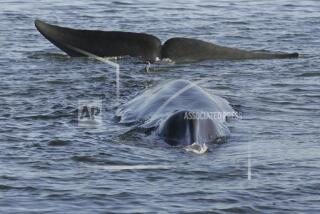A Symbolic Victory for Whaling Advocates
- Share via
FRIGATE BAY, St. Kitts and Nevis — In a narrow vote, the International Whaling Commission declared Sunday that a 20-year ban on commercial whale hunting no longer was necessary because the marine mammals had recovered from near extinction.
The 33-32 vote gave Japan a symbolic victory in its campaign to resume whaling and signaled a power shift within the commission, but did not jeopardize the ban, which can be overturned only by a 75% vote from among the 70 member nations. Environmentalists and other observers called such a scenario unlikely.
The so-called St. Kitts and Nevis Declaration also expressed the deeply divided group’s “commitment to normalizing the functions of the IWC,” a reference to Japan’s desire to return to the organization’s original role as a whalers club with only modest responsibility to manage whale populations.
Sunday’s vote demonstrated that Japan and its pro-whaling allies Norway and Iceland had finally acquired control of the IWC by enticing small Caribbean, Pacific and African countries, some of them landlocked and most of them with no interest in whaling, with lavish aid and assistance in developing fisheries.
Denmark unexpectedly voted in support of the declaration after previously siding with the conservation advocates. It appeared to be swayed by the pro-whaling sentiments of its constituents in Greenland and the Faeroe Islands, despite a generally environmentalist attitude among Danes.
The resolution cast the 1986 whaling ban as a temporary measure aimed at allowing stocks to recover and deemed it “no longer necessary.” It also contended that commercial whaling should resume because the commission’s research had shown that “whales consume huge quantities of fish, making the issue a matter of food security for coastal nations.”
Japan, Norway and Iceland have continued to kill more than 2,000 whales annually despite the moratorium by exploiting a loophole that allows “scientific” whaling.
The host country’s initiative was approved after impassioned statements by Caribbean delegates that the ban was a form of “new colonialism” by wealthy states that seek to impose “emotional” arguments that are detrimental to the small islands’ economic development and natural resource exploitation.
“Years ago, we were told what to eat,” said Claris Charles, Grenada’s Cabinet member responsible for environmental and fisheries matters, recalling how slaves imported to the islands to work sugar-cane fields were fed salted fish by colonial masters.
Cedric Liburd, head of the St. Kitts delegation, proclaimed the decision “a historical one as we move toward normalization of the IWC.”
“We’re hoping this small country, St. Kitts and Nevis, will help to bring the IWC back on its right course,” Liburd said.
Japan’s success in luring a simple majority of IWC’s members to its side provoked anger and predictions of doom for the global whale population among conservation and protection advocates. Only about 1,000 blue whales are believed to survive out of a population thought to have been about 250,000 before large-scale commercial whaling. Whales that populate coastal waters off non-whaling countries, such as the California gray whale, have recovered during the 20-year-old ban.
Mike Townsley, a spokesman for the environmental group Greenpeace, said minutes after the vote that his group “is disgusted that any member of the IWC would seek to promote whaling based upon the false notion that whales consume so much fish that they are a threat to food security.” That assertion, he added, was “a dangerous lie.”
Noting that overfishing by humans has endangered fish stocks, Townsley said that “blaming whales for collapsing fisheries is like blaming woodpeckers for deforestation.”
Kitty Block, an attorney for Humane Society International, deemed the vote the greatest setback for the commercial whaling ban since it came into force. “This is a huge disaster,” she said.
Some whaling opponents sought to point out that the vote changed nothing about whaling practices.
“This is at most a flesh wound. It’s certainly not a death blow,” said Patrick Ramage, spokesman for the International Fund for Animal Welfare, which opposes whaling on ethical and conservation grounds.
But a marine biologist with the group, Vassili Papastavrou, acknowledged that the vote could represent the beginning of the end for those opposed to whaling.
“For 20 years, Japan has tried to win a vote like this at the IWC, and now they’ve done it,” he said. Noting that pro-whaling countries had in effect defied the ban for years through so-called scientific whaling, Papastavrou said the Japanese success in mustering a majority within the IWC was significant because “it gives further endorsement to the whaling that is happening now.”
Japan and its allies celebrated their triumph in gaining control of the whaling body and with it the likelihood of further weakening the IWC conservation profile.
“It’s only a matter of time before it is gone completely,” Glenn Inwood, spokesman for the Japanese delegation, said of the ban.
“This is historic,” said Rune Frovik of the Norwegian whaling lobby High North Alliance. “For the first time in more than two decades, the whaling commission expresses support for commercial whaling.”
The nonbinding resolution followed several defeats of Japanese proposals, and had led environmentalists and conservation groups to believe they could avert the political shift that occurred Sunday.
The anti-whaling faction that includes Australia, New Zealand, Britain and the United States on Friday voted down a Tokyo initiative to permit secret balloting, which would have allowed the small nations to back Japan’s campaign without suffering loss of aid or moral rebuke by countries opposed to killing whales.
More to Read
Sign up for Essential California
The most important California stories and recommendations in your inbox every morning.
You may occasionally receive promotional content from the Los Angeles Times.











